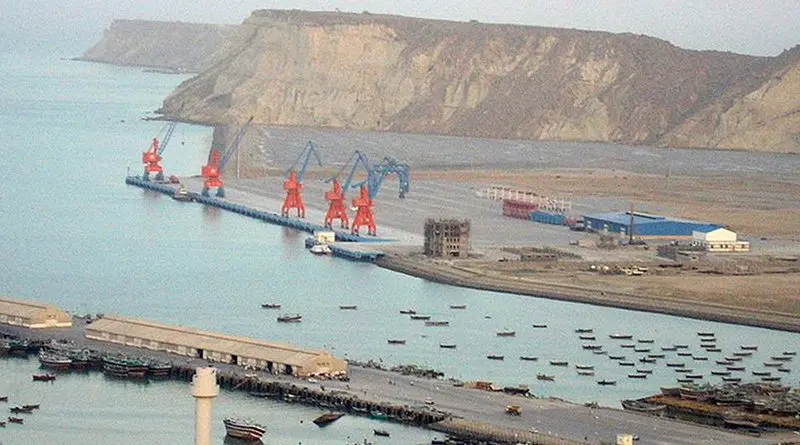Russia-Pakistan Relations: The Bear At Gwadar? – Analysis
Pakistan has decided to accord approval to a Russian request for using the Gwadar port for exports even as Moscow has reportedly showed its willingness to be part of the China Pakistan Economic Corridor (CPEC).[i] This was announced after Russian and Pakistani officials met recently on the sidelines of the Global Conference on Sustainable Transport held under the auspices of the United Nations from November 26-27 at Ashgabat, Turkmenistan.[ii] Russia has since denied its reported intent on the CPEC.[iii]
In addition, according to Pakistani sources, Russia is also looking to develop strategic defence ties with Pakistan. The formal agreements in this regard are expected to be signed between the two countries in the months to come. This article analyses the developments at Ashgabat in the context of regional geopolitics.
Nawaz Sharif who attended the conference in Ashgabat reportedly reviewed progress of the Turkmenistan-Pakistan-Afghanistan-India (TAPI) gas pipeline with President Gurbanguly of Turkmenistan and expressed hope that TAPI would ultimately fulfil Pakistan’s needs for gas and energy. He also sought to enhance connectivity between South Asia and Central Asia by suggesting that railways, road and fibre-optic link be built along the TAPI route.
Sharif also stated Pakistan’s intent to join two transnational connectivity arrangements; the Ashgabat Agreement and the Lapis Lazuli Corridor. The Ashgabat agreement is a transport agreement between Oman, Iran, Turkmenistan, Uzbekistan and Kazakhstan and seeks to create an international transport and transit corridor.[iv] India has been lobbying hard to be a part of this agreement. The Lapis Lazuli Corridor on the other hand seeks to foster transit and trade cooperation between Afghanistan, Turkmenistan, Azerbaijan, Georgia and Turkey by reducing barriers to transit trade.
The developments at Ashgabat are classic geopolitics, with nations generating options to existing agreements and alignments and finding new common grounds. Pakistani actions were driven by three possible reasons; one, it needs new partners because, as many analysts point out, it is getting isolated in its neighbourhood and consequently is becoming far too dependent on China. Two, it needs a counter to India’s ‘SAARC minus one’ push by looking west and north for friends and a new grouping; ideally one without having India in its membership. Three, hopefully it has taken some lessons from the debt trap Sri Lanka has got itself into by agreeing to expansive Chinese funded projects of dubious viability . To that end it needs to diversify its trade and commerce, hence the desire to join the Ashgabat Agreement and the Lapis Lazuli Corridor. Pakistan needs to sell its ports access through Afghanistan to generate leverage with its warring neighbour by offering it easy transit revenue for goods and gas.
In an interesting development the Afghan Taliban has offered to protect major government projects in “in the higher interest of Islam and the country”[v]. These projects include the Mes Aynak copper, CASA1000 and the TAPI. Needless to say the Taliban is looking generate its own share of transit revenue.
President Gurbanguly of Turkmenistan said he wanted improved road links between Turkmenistan and Pakistan so that his country is able to export through Gwadar and Karachi ports. Turkmenistan does not need Gwadar and Karachi ports for its exports after transiting through an unstable Afghanistan, when it has more secure and shorter access to Iranian ports. However, it does need Pakistan for TAPI and to setup an alternative market to China for gas, its largest export. Turkmenistan has not been able to secure access to EU markets for its gas and Russia has stopped off-taking Turkmen gas, making the country totally reliant on the Chinese market.
For Russia cordial relations with Pakistan are a precursor to the ‘energy bridge’ it wants to build to India, evident from the India-Russia joint statement at Goa.[vi] A swap arrangement with Turkmenistan will facilitate that. It will also get another point of agreement with Pakistan regarding peace in Afghanistan; a key driver of Russia-Pakistan relations.
For India, Russia presence at Gwadar, albeit commercial, sounds good. A resurgent Russia in the region is geopolitically a better bet than a reluctant USA.
Source:
This article was published at CLAWS
References:
[i] Khalid Mustafa & Muhammad Saleh Zaafir. ‘Russia allowed use of Gwadar Port, ’The News,’ November 26, 2016. https://www.thenews.com.pk/print/167827-Russia-allowed-use-of-Gwadar-Port
[ii]The Global Sustainable Transport Conference, Sustainable Development Knowledge Platform. https://sustainabledevelopment.un.org/Global-Sustainable-Transport-Conference-2016
[iii] http://southasiamonitor.org/news/statement-of-the-ministry-of-foreign-affairs-of-russia-in-connection-with-reports-in-pakistan-s-media-about-the-russian-federation-s-participation-in-the-creation-of-china-pakistan-economic-corrirdor/inthenews/20725
[iv] ‘Pakistan approves Russia’s request to use strategic Gwadar Port,’ The Indian Express, November 26, 2016. http://indianexpress.com/article/world/world-news/pakistan-approves-russias-request-to-use-strategic-gwadar-port-4396503/
[v]‘Afghan Taliban offer security for copper, gas projects,’ Reuters, November 29, 2016. http://in.reuters.com/article/afghanistan-taliban-idINKBN13O14F
[vi]Dipanjan Roy Chaudhury. ‘India and Russia may agree to create an “energy bridge”, The Economic Times, October 14, 2016. http://economictimes.indiatimes.com/industry/energy/oil-gas/india-and-russia-may-agree-to-create-an-energy-bridge/articleshow/54684635.cms
– See more at: http://www.claws.in/1672/russia-pakistan-relations-the-bear-at-gwadar-monish-gulati.html#sthash.w0KDpvkI.dpuf

